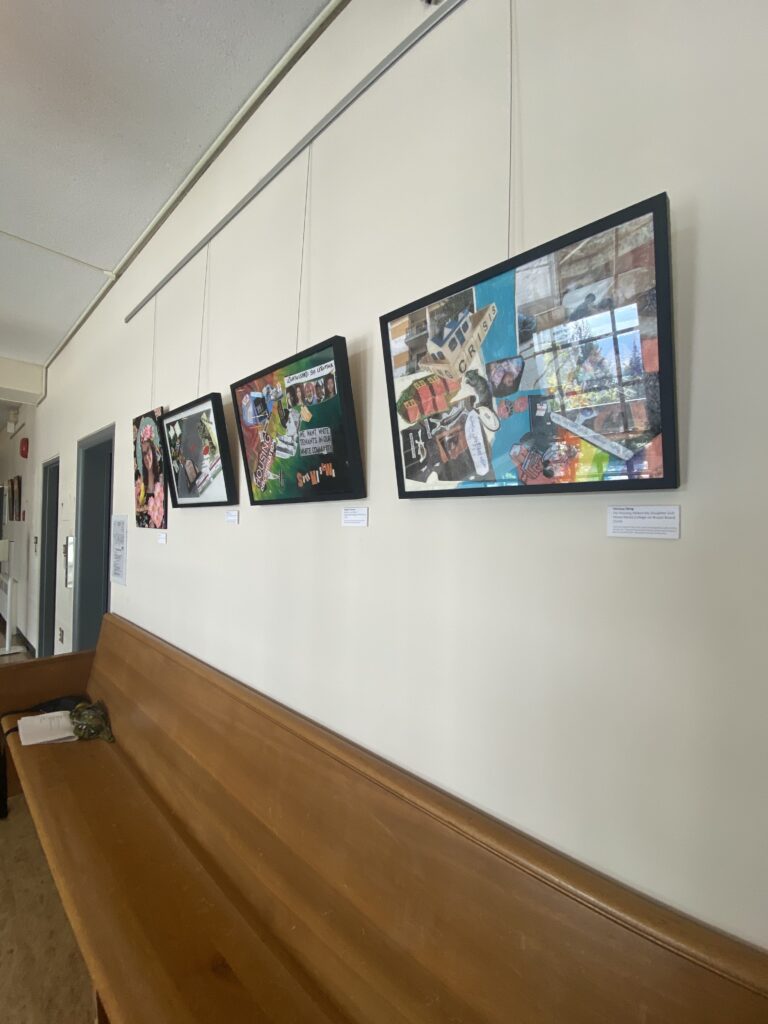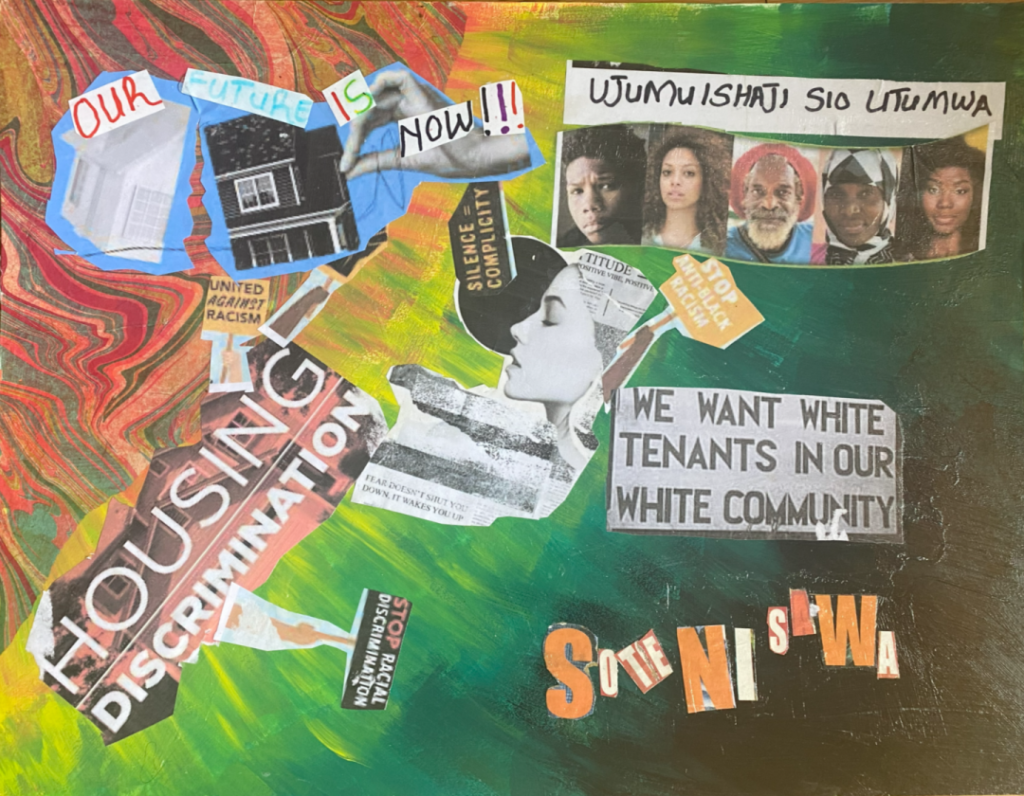Amal Ishaque is a multidisciplinary artist, Pushcart Prize nominated poet and award winning arts educator. They are currently in the midst of a three year arts residency with the Changing the Conversation project. The project’s goal is to shift the narrative about housing insecurity and centering the voices of those most impacted. Changing the Conversation is a joint initiative between Douglas College, the Arts Council of New Westminster, the City of New Westminster and other partners.
For the residency, Amal has been working with Community Action Network (CAN) peer leaders with current experiences of housing insecurity, as well as others impacted by the housing crisis.
Art work by CAN peer leaders, Amal and other community members is currently being exhibited at New Westminster City Hall till January 2025. The exhibit features photography, analog and digital collages and poetry broadsides that speak to the intersections between housing insecurity, queerness, ableism, anti-Blackness, motherhood, poverty, war and displacement, street sweeps, encampments and more.
Come check out the exhibit on until January!
New Westminster City Hall
511 Royal Avenue
Monday-Friday, 8:30am to 4:30pm
Keep an eye out here for related events and updates. For more information about Amal’s work: rosewaterpoet.com
Below, Amal shares an update on how things have been going.
When the topic of housing insecurity arises, there is so much that comes to mind or that pops up in headlines and statistic after statistic. In the midst of overlapping climate, toxic drug poisoning and housing crises, as well as multiple global genocides and mass displacements, what is the responsibility of the artist?
In the deeply prescient words of James Baldwin, “The role of the artist is exactly the same as the role of the lover. If I love you, I have to make you conscious of the things you don’t see.”
As someone who comes from a long cultural lineage of artists and poets bearing witness and even facing persecution for speaking truth in the face of power, James Baldwin’s words have been an ethical compass grounding my work.
What drew me to this project was the opportunity to fuse my own past lived experiences as a queer, racialized person who faced housing insecurity with years of community engaged art practice and frontline organizing.
In 2023, during the first year of the residency, I facilitated weekly art creation workshops in Moody Park with Community Action Network (CAN) peer leaders who were experiencing housing insecurity.
When we first started meeting, CAN leaders asked if they were only allowed to talk about housing insecurity and not other issues impacting their lives such as anti-Black racism, ableism, war back in homelands, being single mothers and more. I shared that to express themselves about housing insecurity without also speaking about the other intersections impacting their lives would mean leaving crucial parts of themselves out of the picture.
The priority was creating as safe a container for the group as possible, a scaffolding built with an ethic of collective care where all felt seen and heard. For the first few sessions this meant letting go of expectations as a facilitator while gently creating and holding the necessary space for the group. Most of them declared early on that they were not artists and as such, weren’t necessarily comfortable creating any kind of art.
Gradually, as our trust as a group built, we started to explore the intersecting issues connected to housing insecurity and other experiences. This required vulnerability on all our parts, including mine. I opened up about my own past experiences of housing insecurity, racism, gendered violence, queerness and more. I also spoke transparently about the power I held in my role as the group facilitator and artist in residence.
My past and current experiences as a tenant and my work as a community organizer, especially as the co-founder of a mutual aid network in a working class neighbourhood, helped build my connection to the group and build trust with each other. When participants needed immediate support with housing issues I arranged for the New West Tenants Union (NWTU) to meet with them. NWTU had been following Marpole Mutual Aid’s work for some time so it was easy to connect on an organizer to organizer basis and translate that into support for CAN peer leaders. We also met to share strategies about how to integrate direct mutual aid support more fully into tenant organizing.
We’ve been emphasizing throughout the residency that while policy shifts are of course crucial, we must also support community members with their immediate, practical needs in regards to housing precarity. While people in power discuss policy change at important events, CAN leaders and other renters are living with mold, mice, inaccessible housing, racial and gendered harassment from landlords and countless other issues. Unhoused people are being violently swept from one neighbourhood to another, perpetually displaced with waitlists of years for any kind of affordable housing or supports. Our neighbours and communities are dying from a toxic drug supply and the ever escalating criminalization of poverty. The community members I’ve had the honour to collaborate with these last several months connect these dots seamlessly.
A large component of this arts residency is to mentor community members. A central principle for me, as a Freirean influenced popular educator and a community engaged artist, has always been the concept of lateral mentorship and the critical importance of lived expertise. Whether I am facilitating a racial justice workshop as an anti-oppression consultant or art creation sessions, the premise is always that I learn as much from participants as they do from me. Mentorship is not a binary, top down concept where I speak or create on behalf of those directly impacted by structural inequities. My role as a facilitator and artist in residence isn’t to be a saviour. It is to be an accomplice who leverages both my craft as an artist and my privilege to unequivocally centre the voices of those experiencing housing insecurity as the foremost experts on the issue.
These sessions required me to wear many hats: advocate, artist, community member and always, the facilitator responsible for creating and holding a safer space that encouraged both sharing and art creation on participants’ own terms. CAN leaders in turn entrusted me with their stories, showing up with courage and so much generosity for me and for each other. The way they modelled collective care, truth telling in the face of immense barriers, community organizing and a nuanced, first hand understanding of what it would take to address the housing crisis for their communities taught me so much.
“The teacher is of course an artist, but being an artist does not mean that he or she can make the profile, can shape the students. What the educator does in teaching is to make it possible for the students to become themselves.” – Paulo Freire
CAN leaders created incredibly powerful analog collages and wrote poetry about their experiences at the intersections of housing insecurity and other interconnected struggles. There are a lot of assumptions in the art world that everyone just magically knows how to do the basics such as writing bios or descriptions of their art work. In every community engaged residency, I share as many skills as possible with participants and demystify these processes. A proverbial dismantling of the gates of insider knowledge if you will.
We collaboratively edited each participant’s poem so that the group could learn editing skills and how to give and receive compassionate and constructive feedback. I worked with each person to write artist bios as well as short artist statements and labels about their work. We problem solved together when something came up in the process of creating the work, building collective confidence and deepening our connection to each other.
Our collective work was shown at the Anvil Centre in the fall of 2023. It was a seminal moment where everyone in the group finally felt that they really were artists now. Subsequently, I’ve organized and hosted artist talks, panels and poetry readings in New West with CAN leaders and other community members such as organizers from Chinatown Together. These events have explored the intersections between housing insecurity, racism and art as a catalyst for social change. We also exhibited some pieces for several months at Wildfires Bookshop and received really beautiful feedback about them. The bookshop is a wonderful, queer woman of colour run community hub that has become such a welcoming, important creative sanctuary in New West. We’ll be doing a panel at the upcoming Housing Central Conference in November.
Creating art is of course central to the residency and it’s been just as important to bring the work and related conversations into the community. The turn outs at the events has been amazing. It’s very clear that people want to have discussions that centre the frontline voices of those impacted by the housing crisis and other intersections.
Currently, all of the art work is showing at City Hall in New West. We’re so excited to have it there! The first thing CAN leaders said when we started meeting was that they wanted their work to be in the halls of power. CAN Leaders whose work is featured in the exhibit: Kelly Teal, Margaret Wanyoike, Monica Deng, Richard Schabler and Tina Carl.

The exhibit includes a new photo series called Trespassing Humanity which focuses on the eviction defense of the recent Marpole encampment. Many of the encampment residents were told to move there by the City of Vancouver after they were swept from the DTES. The province claimed to be obtaining housing for some people but in reality they were offered a few nights stay in shelters. Many felt safer in the encampment. Marpole Mutual Aid members worked for days in the mud and rain, trying to mobilize the tiny home of a senior who was the encampment’s longest (and original) resident in order to move it to another location before the province and the VPD destroyed it. The resident had put all his savings into making the home. Eventually, together with community we managed to save it but it took painful, highly stressful daily negotiations with the province, with police ever present, to get even a short stay of mercy. The encampment was on a piece of land that was not used by anyone in the neighbourhood. It has not been used for anything since the eviction. All residents were displaced.
Visit the exhibit at City Hall. It will be showing till January 2025.
Amal is looking for more opportunities to share poetry created during the arts residency and do more artist talks, arts workshops and panels on the intersections of housing insecurity, art as a catalyst for social change and intersecting struggles. Get in touch with them here.








